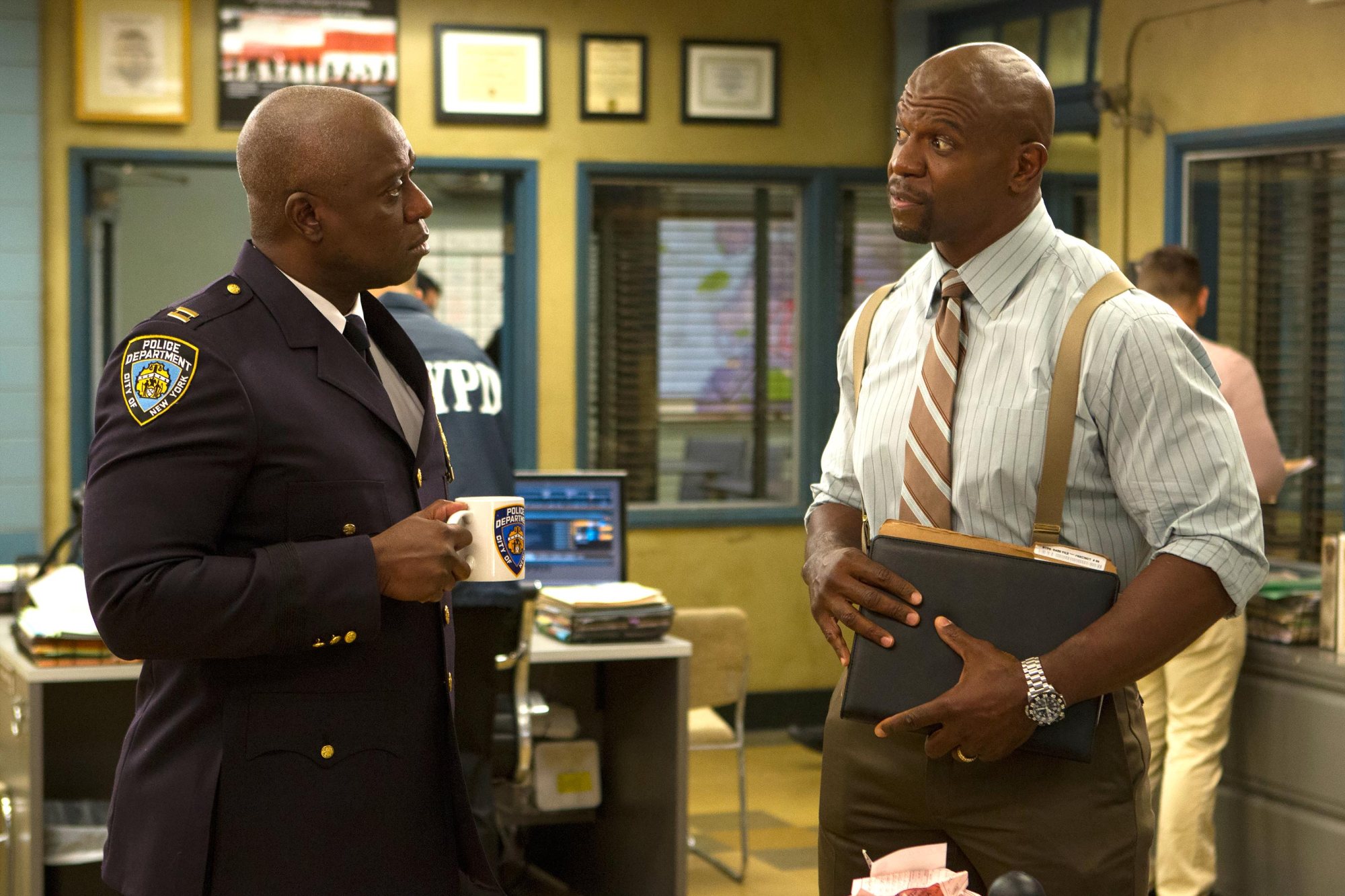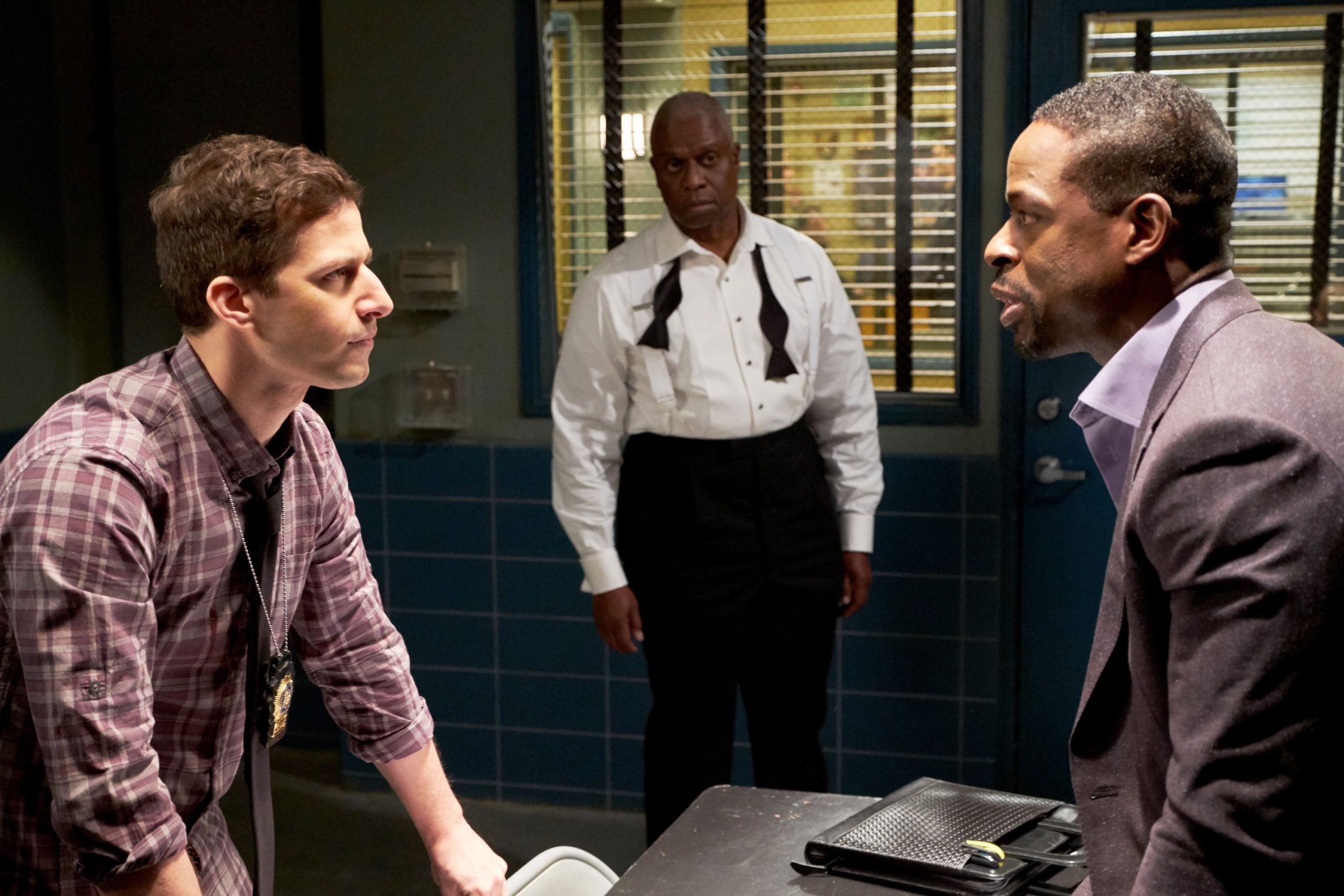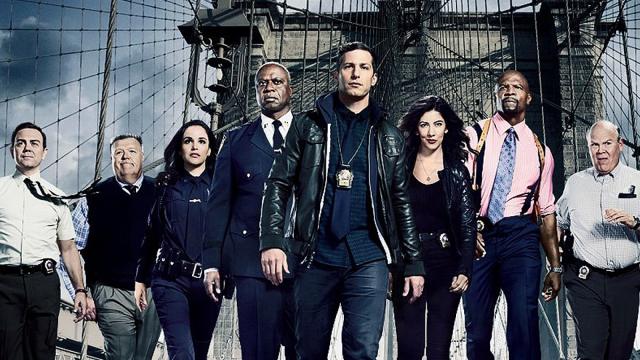As a general rule, I don’t like cop shows. Until recently, I made one exception.
That show was Brooklyn Nine-Nine, an NBC series that just wrapped up its seventh season. It’s more of an office comedy than a cop show, which is what I liked about it. Many of its situations, which involve an admirably diverse cast of misfit detectives, could take place in any environment in which a bunch of squabbling pals are crammed into a sardine-tin series of rooms. The police precinct is just a backdrop.
Many episodes only vaguely include police work, or they don’t include it at all. Main character Jake Peralta’s maverick cop tendencies are just an excuse to explore his dysfunctional upbringing and how he’s found a better family with his coworkers. Captain Raymond Holt and Sergeant Terry Jeffords quickly go from being authority figures to dual fathers of the whole force. More guarded characters like Rosa Diaz and Holt — both queer and products of environments that refuse to accept that — learn how to open up over time. And so on. Brooklyn Nine-Nine is, at its heart, a show about loveable doofuses learning how to be better people and, ultimately, a family.
But it’s still a show about cops. Not only that. It’s devoutly committed to the myth of the good cop — that there might be some bad apples, but somehow, they don’t spoil the whole bunch. Now, with the country consumed by conversations about whether or not policing as an institution is even salvageable, it all seems woefully naive. With all eyes on them, cops continue to instigate violence, escalate otherwise manageable situations, and kill people. No good cops are putting their feet down and grinding this machine to a halt. If any are, they’re being overwhelmed by officers who, say, resign en masse in solidarity with a pair that got suspended for knocking a 75 year-old man to the ground and causing him to bleed. Trying to imagine Brooklyn Nine-Nine’s happy-go-lucky cast amidst all of this breaks my brain.

It’s also made me realise that Brooklyn Nine-Nine has always been broken. As a white guy, I’m far from the first person to think or posit this. But I think some of the particular ways in which the show is broken are especially insidious in light of recent events and, to take things a step further, run contrary to what the show itself seems to espouse. Thus, I will make this argument upfront: The only way for Brooklyn Nine-Nine to make any sort of coherent narrative sense is for its characters to quit their jobs as cops and become social workers before the show ends.
Over the years, Brooklyn Nine-Nine has tackled a wide range of real issues endemic to policing. One particularly memorable episode sees Jeffords get arrested by a fellow cop in his own neighbourhood, simply because he’s black. Others deal with sexual harassment and assault, stop and frisk-style policing, citizens’ valid distrust of police, and the proliferation of old, corrupt white men running the system. Compared to many other cop shows, Brooklyn Nine-Nine’s heart is in the right place. It does not seem to want to be copaganda — at least, not in the traditional sense that many other cop shows are.
But that’s the problem. There is a profound dissonance to, on one hand, at least nominally condemning many problems embedded in policing’s bedrock, and, on the other, depicting products of that system as wholesome, upstanding citizens. Despite everything, the show refuses to condemn policing as a whole. The system is bad and some cops are bad, it says, but the idea of policing can be redeemed if you just put the right people in charge. The good cops. Many other shows refuse to admit that the system is bad. They’re wrong, but at least they’re shaped by a coherent worldview. Brooklyn Nine-Nine, faced with even the slightest scrutiny, makes no sense.
As a result of this, character motivations regularly fall apart or defy the structures that ostensibly produce them. The show posits regularly that its cast of good cops want first and foremost to serve their communities — that they, unlike many real cops, are from these communities and know them intimately. Characters regularly state these things to this effect. But also, these characters are all about bagging as many criminals as possible, and those faceless criminals are intrinsically bad people, or at least people who deserve to go through the hell that is incarceration. Peralta, his best friend Charles Boyle, his rival-turned-wife Amy Santiago, and all the rest are unfalteringly good by the show’s standards. Quotas, prejudices, and other elements of a broken system play a role in their lives, but those systems bend to fit their goodness depending on the needs of the moment.
Even when faced with moral shades of grey — unjust arrests, attempted bribes, criminals who aren’t actually bad people — and even when they make calls that’d be considered questionable by real world standards, the show bends over backwards to demonstrate that they were in the right, or that they’ve learned and grown from the experience.
For example, in one episode, Peralta straight up gets a man, the biological father of Boyle’s adopted son, tasered and deported, but it’s ultimately a vehicle for Peralta to learn that he shouldn’t have meddled in his best friend’s family affairs — not that he shouldn’t have used violent force to do it. The structure of the show demands this. It is first and foremost a lighthearted comedy about likable characters. If characters failed too often in morally dubious situations, they would no longer be likable.
As a result, even when characters do use their government-granted powers for evil, Brooklyn Nine-Nine gives them a pass. Multiple episodes centre around main characters detaining suspects for as long as possible while scrambling to pin evidence on them. In real life, this is a terrible practice in which cops regularly lie and try to trick people into confessing to crimes they didn’t commit. In season five episode “The Box,” Peralta and Holt do exactly that, repeatedly, until the very last possible second, to catch a dentist-turned-murderer red-handed.
It’s riveting television, a psychological game of cat and mouse that’s practically in a different genre than the rest of the show. But when all is said and done, it also suggests that the means justify the ends. Moreover, the episode doesn’t really question those means as part of a broader system, one in which they are regularly misused. In the hands of Brooklyn Nine-Nine’s good cops, even the most terrible of tools are, by association, also good.

In the face of the show’s increasingly frequent engagements with policing’s systemic issues, characters’ casual abuses of a broken system again make no sense. Season five’s opening two episodes see Peralta go to prison (on false charges, of course) and learn, shock and surprise, that prison is miserable and inhumane, and that people who run prisons are unfalteringly corrupt.
While there, he makes direct statements about this, practically staring into the camera. “What hurts the most is knowing that prisoners are treated this way every day in our penal system,” says Peralta after being brutalized by a guard. “Also, he kicked me in the wiener a bunch.” But then, two episodes later, he returns to the force and continues arresting people, dooming them to the same fate. This episode briefly flirts with the idea that Peralta might be worried about accidentally sending innocent people to prison as a result of his experiences, but after that, he goes back to being his same old, often-reckless self.
Even before recent seasons, Peralta’s motor-mouthed asides about societal injustices were a hallmark of the show. But they, alongside his experiences throughout the show, suggest a broader worldview that, in the long run, just isn’t compatible with police work. He is able, on one hand, to excitedly lose his shit over every crime that involves big vehicles and heavy weaponry — anything that lets him feel like an action movie hero — while in other episodes questioning police militarisation and saying that “our country is broken” after he’s allowed to buy heaps of guns and ammo sans ID. He is somehow both the worst kind of cop — the wannabe action star/soldier — and the creators’ soapbox against injustice.
It’s a terrible combination that suggests there might be redeeming value to police who sign up primarily for the guns and action, the ones who are cosplaying as soldiers and inflicting violence on innocent people across the country right now.
Peralta is the most egregiously contradictory character, but he’s far from the only one. Captain Holt has spent much of his career trying to become Commissioner of the NYPD so that he can right the wrongs he experienced as a gay black man in the police force. Each season, the system finds new ways to thwart him until, finally, in season six, he loses out on a promotion to Commissioner, with the position instead going to an old white man who ultimately implements an illegal surveillance network that the main characters have to band together to take down.
And yet, though Holt’s confidence in the system has evidently been shattered multiple times, he goes back to serving it for… reasons, I guess. You could argue, at least in his case, that he’s stuck in his ways, that he doesn’t know how to be anything other than a cop at this point in his life, and make a compelling story out of it. So far, though, the show has not tried.
Increasingly, as Brooklyn Nine-Nine has chosen to condemn more and more elements of policing, the show has presented the main cast as the only good cops. They do not leap to defend corrupt cops. They do not lock arms with the police union every time they make a mistake, like real cops. They only rarely receive the same institutional benefits as real cops. In general, they do not find support outside their own walls. Surely, under those circumstances — with downsides even more clear than they are in real life and upsides few and far between — these particular, kind and caring characters would ultimately come to the conclusion that policing is beyond redemption.
If their aim from the get-go has been to serve their community, as they have stated, why not go into social work or some related field? This particular show, given the priorities of its characters and elements of its expressed worldview, has basically already laid the groundwork for an arc about either defunding the police or, at the very least, having characters pursue other lines of work that are not tied to rampant militarisation and use of force.
I do not believe Brooklyn Nine-Nine will actually do this — at least, not in the near future. While the show’s cast and showrunner recently donated $US100,000 ($146,150) to the National Bail Fund Network, season eight is scheduled to air this spring, meaning it was likely largely complete before the latest national conversation about defunding the police began. But even past that point, I remain doubtful. Activists have been pointing out policing’s ills and advocating abolition for decades.
The intrinsic violence of the system made itself impossible to ignore long before Brooklyn Nine-Nine came to be. Heck, it was the Obama era — which Brooklyn Nine-Nine’s belief in fixing broken systems with “good” people feels like a throwback to — that produced the Black Lives Matter movement. It’s trite to point out that mass media and pop culture will not save us. When it comes to depictions of the police, though, I’m not sure pop culture can even reliably keep up with the world it’s a part of, even when it seems to be trying.

Leave a Reply